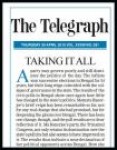Mamata triumphs, Telegraph carps
The editorials focused on the BJP's failure to emerge in second place.
DARIUS NAKHOONWALA looks at how Mamata fared in their judgement. Pix: The Telegraph edit on 30 April, 2015.

You don’t say!
Darius Nakhoonwala
It’s hard to say which is more attractive to editorial writers: politics, Kolkata or Mamata. Whatever it is, every major paper wrote an edit on the TMC’s massive win in the civic polls in Bengal.
In contrast, only three thought that the ongoing tussle between the judiciary and the government was worth noticing. It was, if you will, like the difference between Bollywood’s art films and masala films.
For once, the Telegraph looked smart and shot off an edit on the same day. Usually, it takes it a couple of days to gather its noble thoughts. This time, though, the nobleness was replaced by ungraciousness.
Here are some samples: “Mamata Banerjee's brief reign has been remarkable so far… for deepening the gloom over Bengal…The results indicate a near-decimation of her political opponents... How she managed this in spite of such a dismal record in governance may be explained as much by her political style as by the weaknesses of her opponents…the TMC's victories in most places across the state were never in doubt. Yet, (there were) numerous complaints about violence and the rigging of the polls…blatantly partisan administration aided and abetted her, just as the case was during the days of the Left's rule.”
Yo, man, you could have written all this after a few days.
Then the edit noted how the BJP bubble had been pricked and how the “leftists may not be too unhappy with the results - they may not yet be in a position to challenge the TMC, but they have shown signs of re-emerging as the main opposition force.”
The Hindu made the same point that the second place had gone, not to the BJP (which didn’t win even a single seat) but to the Left. So it said that “Despite finishing second, the Left Front could have found little cheer in the results… the CPI(M) could have done far worse than finishing a poor second…Any failure to retain the second spot would have meant further erosion in the base of the Left, strengthening the BJP… The battle was for the second place, and the BJP has lost it.”
The Times of India said exactly the same thing. The election, it said, “provided an opportunity to see if the Left had recovered any ground or if BJP had made significant inroads into Bengal’s electorate.” But that “Trinamool has steamrolled the opposition.” It ended the edit with some advice for Amit Shah who it said “needs to take note of the BJP’s singularly lacklustre performance. The BJP’s campaign was marred by infighting and the lack of a strong Bengali-speaking state leader.”
The Hindustan Times, in a very carefully worded edit, said much the same things. And it offered a candy to Ms Banerjee who, it said, despite reports to the contrary, “… for all her shortcomings as a mercurial person, is a charismatic politician though she hasn’t been able to turn round the state in the way she suggested that she would.” It warned her to discipline her workers who had caused so much violence.
But it was the Pioneer, which complained loudest about the violence - before the polls and the results. “Booth capturing, poll rigging, bomb blasts and assaults on party activists, poll staff, police personnel and even the public, were reported from all over the State - an ignominious repeat of the 2014 Lok Sabha poll. Three Congress members were injured while BJP leader and actor Rupa Ganguly was previously attacked by political goons on the campaign trail. Some senior Left leaders, including former Ministers, also complained that they were being threatened and intimidated…This doesn't seem surprising at all when one considers the fact that the lumpen elements, who once did the Left's dirty work, have moved en masse to the Trinamool Congress.”
The Indian Express said that “the Trinamool has managed to keep in check its main rival, the CPM, and potential challenger, the BJP…By all accounts the opposition didn’t have the tactical imagination or the organisational machinery to deepen the faultlines within the Trinamool or exploit the possible dissatisfaction with the Mamata administration… The CPM appears to have arrested its decline, though a revival is not in sight.”
Amongst the business papers, only the Business Standard and the Economic Times wrote edits. The former wrote about the achievements of the Mamata government, which no other paper did: “Her government…seems to have worked hard to fix the state’s finances… has not hesitated to raise user fees for utilities… adopted technology to improve tax collections.. sold five state-owned tea gardens to private players... even declared that there is no space in West Bengal for strikes or bandhs… relaxed the land ceiling law, allowing real estate projects to build beyond the 24-acre legal limit...” And so on, including her success in bringing Naxalism under control, notably in Jangal Mahal. It concluded that though it may “have taken time, it looks like the West Bengal government is getting into its stride.”
The Economic Times wrote nothing memorable.
Such articles are only possible because of your support. Help the Hoot. The Hoot is an independent initiative of the Media Foundation and requires funds for independent media monitoring. Please support us. Every rupee helps.
Subscribe To The Newsletter






